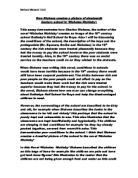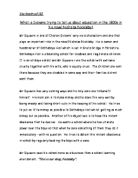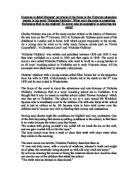Dickens includes many typically recognisable characters. Firstly, there is the handsome naive young hero, who is usually good hearted, courageous, honest and sympathetic. Such persons bravely battled against the evil until they often, quite expectedly won. Secondly there are the types of villains who are evil to the core who take many different shapes comic, brutal and bizarre like the Squeers family or sinister cold and calculating like Uncle Ralph. The third group of characters are the mysterious such as Smike and Newman Noggs. Smike plays the role of the disheartened boy, who when young, was abandoned at Dotheboys Hall. We later find out that he is the son of Uncle Ralph. Mr Squeers sees Smike as ‘a handy fellow out of the doors and worth his meat and drink’. When we meet Smike for the first time we can see that Nicholas is taken back by what he sees for, ‘he could not have been less than eighteen or nineteen years old, and was tall for that age, he wore a skeleton suit, such as it usually put upon very little boys which, thought most absurdly short in the arms and legs, was quite wide enough for his attenuated frame.’ We get to see how bizarre this strange character really is in this wonderfully tragic account. Also Dickens also had a rich secondary characters involved in his stories. In ‘Nicholas Nickleby’ they are played by the characters of the neglected children.
At this point in my essay I would like to focus on Dickens and how, in these three chapters, he creates a classic version of his hero figure through the thoughts and deeds of Nicholas Nickleby. The novel tells the story of a family left in destitute after the death of their father. The sad Nicholas Nickelby, his mother and his beautiful sister Kate turn in desperation to their father’s evil brother uncle Ralph because Nicholas father has left them penniless. As soon as Nicholas gets to London his Uncle Ralph sees him as a threat and finds him a job, to work as an assistant teacher. Nicholas is sent to Yorkshire to work in a school called Dotheboys Hall so he can earn a living for the first time in his life. When Nicholas arrives at Dotheboy hall he is stunned by how the little boys are treated. They have no food they were all sleeping four to a bed. Nicholas was shocked by how Squeers lies to the boys and to the boy’s parents. He tells the parents how well their boys are doing in fact the children were weak fragile and bruised all from Squeers beatings. Nicholas is shocked by near enough everything he sees as it says in the text ‘Nicholas opens his eyes, but not his mouth’. This was because Mrs Squeers and the girl dragged in a small straw mattress and a couple of blankets and Squeers then went on to say ‘You’ll always find a little bit of soap in the kitchen’ Nicholas would not have been used to such abject poverty and would have expected home comforts such as a bed and washing facilities. Also when Nicholas arrives he finds out that Mr and Mrs. Squeers priorities are the cattle. They have so little regard for the children, as when Mrs. Squeers tells Mr Squeers of the steak, “I bought a good large piece of it myself on purpose for-“she is cut short because Mr. Squeers think she has bought the meat for the boys, but holding his hand she quickly says “Lor! You don’t think I could have made such a mistake as that.”
Nicholas stays silent often and says very little through the story because he knows if he opens his mouth and says something to the Squeers they would just tell his Uncle Ralph. This is because he is shocked by what he is seeing and he has never met such horrible, evil people in his life. He thought there were only decent kind people in the World. When Nicholas reads the letter off Newman Noggs “Nicholas Nickleby’s eyes were dimmed with moisture that might have been taken for tears.” Because he sees how Noggs shows some kindness to him in contrast to the Squeers. Nicholas sees the good in people, Nicholas knows that there are still good people in the world .Newman Noggs had every reason to be very bitter and full of anger at the world but he was a good person at heart.
Nicholas is sympathetic and kind towards everyone. Dickens shows this by seeing the action through Nicholas eyes and as he is a naturally good person he condemns all cruelty. He is especially affected by Smike “The look was a very painful one, and went to Nicholas’s heart at once; for it told a long and very sad history.”
Nicholas finds Smike a sad and pathetic creature and feels deep emotion for him. Nicholas took this job at Dotheboys Hall because he didn’t want his Mother and sister Kate to go into the poorhouse; this shows his sense of duty and moral conscience. For this strong sense of respect, honour and the desire to help people we see Nicholas later triumph and win deserved happiness. It soon becomes clear that if it wasn’t for his family, or to help the boys he would have packed up and left. As it says in the text he decided “For a time, to bear whatever wretchedness might be in store for him and that remembering the helplessness of his mother and sister” He decided to tolerate the horrors of life at the Hall.
Nicholas after so long becomes angry “ Nicholas sat down, so depressed and self-degraded by the consciousness of his position, that if death could have come upon him at that time he would have been almost happy to meet it.” It is obvious that he is deeply shocked and been keeping his feelings bottled up inside, so that when he contemplates his fate, “Nicholas signed involuntarily at the though of the agreeable domestic prospect thus opened to him.” When Squeers was beating Smike Nicholas couldn’t take it any more he has held himself back so many times from saying something to Squeers that he was going to explode if he didn’t say anything. Nicholas suddenly cried out ‘Stop!’ in a voice that made the rafters ring. Mr. Squeers didn’t no where this sound had come from and he shouted ‘Who cried stop?’ ‘I’, said Nicholas. Nicholas couldn’t watch these beatings to the boys any more and had to take matters into his own hands, he had to try and stop Squeers doing this. Nicholas told Squeers again ‘I must not,’ repeated Nicholas, nothing daunted; ‘shall not. I will prevent.’ Nicholas was getting more and more angry with Squeers because he wasn’t listening to him and was getting ready to hit him. ‘My blood is up, and I have the strength of ten such men as you. In a violent outbreak Nicholas got Squeers. Nicholas sprang upon him, wrested the weapon from his hand, and pinning him by the throat, beat the ruffian till he roared for mercy. Only Smikes beating that makes him react over comes him and turn on Squeers.
In these three chapters, Dickens creates both a complex and clear picture of how one of his hero-figures mind works. Dickens is telling us how a decent person should think and act through his portrayal of Nicholas, we also realise what is important to him. They should want things to change for the better, they should fight injustice, and they should always put others before themselves. Dickens always explains his hero’s action by linking them to their feelings i.e. we are never given insight into Uncles Ralph mind, but we always have an insight into Nicholas’s. A hero on Dickens terms should always be: brave, kind, honest and sympathetic. Nicholas character brings together episodes to a very strong thread of Dickens work: entertainment. He manages to get across the pain and suffering of the boys so well, he really captures the reader’s heart through his descriptions of Smike and the appearance of the children. After his own family’s suffering he knew just how cruel the legal system was, and so he wanted the members of the upper class to read his novels and change the life of such people.







